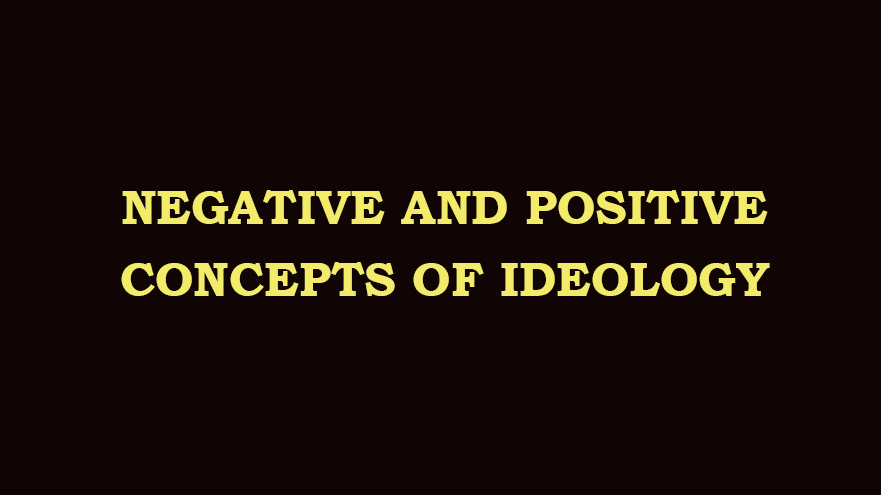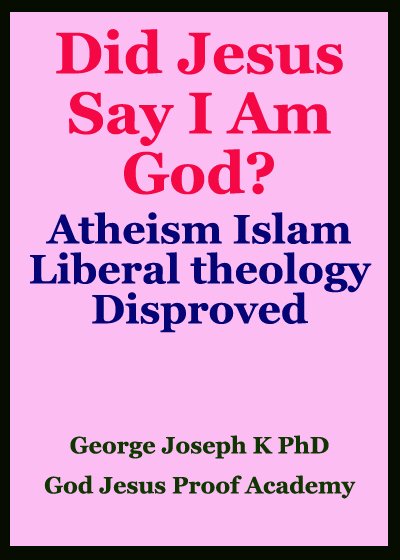
NEGATIVE AND POSITIVE CONCEPTS OF IDEOLOGY
Discussions about ideology can generally classified into two broad areas namely ‘ideology in knowledge ‘and ‘ideology in politics. In the first area of ‘ideology in knowledge’ attempt is to understand to what extent man’s knowledge is ideologically conditioned or distorted. Here ideology is contrasted with “truth” science and valid knowledge in general. In the second area of ‘ideology in politics’ the question is whether ideology is an essential feature of politics and, if so, what does it explain. In its enquiry is concerned only with the functional value of ideology and not with its truth value (See G. Sartori. Op. cit.P.398). The Marxist conception of ideology or the critique of ideology tradition as a whole fall into the category of ‘ideology in knowledge’ (Idem). Marx inherited the word ideology from the cumulative usages current in the 1830s and 1840s. He was familiar with Napoleon’s derision of ideology. Marx’s reading of Tracy’s economics, especially the word ideology with bourgeois class interests. The ‘Ideologues’ (as Tracy and his followers were known) were a group of propertied intellectuals. (See K. Marx and F. Engels. The German Ideology Moscow: Progress Publishers, 1964. PP. 245 – 46; E. Kennedy.Op. cit. P. 368, 358). Tracy’s definition of society “As……. Commerce …… his assertion…. that only capitalist is truly productive …. His identification of all particular interests with the general interest, his unqualified enthusiasm for the limitless division of labor” (E. Kennedy. op. cit. P. 368). All these led Marx to call him a bourgeois doctrinaire.
Thus, for Marx ideology became a system of thought which south to justify the existing mode of production, and the social relationships which originated from it. For him ideology meant by dishonest use of reasoning to justify social wrongs or to encourage wishful thinking. It was a conscious or unconscious distortion of views and facts so as to make them serve the interests of the holder of the view or the possessor of the facts. The main Marxian thesis about ideology was that classes develop ideologies in order to serve the interests of the classes. It was a body of thought possessed by a social group in order to promote its interests by deliberately concealing the real conditions of life. Thu8s Marx’s concept of ideology implies a negative evaluation. (For details See E. Kennedy. op. cit. P. 368; K.P. Mukherji, Implication of Ideology – Concept. Bombay: Popular Book Depot, 1955. P.14; A. Naess et al. op. cit. P.160; K. Marx and F Engels. Op. cit. PP. 461 ,317,60-62; B. Parekh, Marx’s Theory of Ideology. London: Croom Helm, 1982. P.214; For a more detailed discussion on Marx’s concept of ideology see W. Carlsnaes. The Concept of Ideology and Political Analysis: A critical Evaluation of its Usage by Marx, Lenin and Mannheim. Connecticut: Green wood Press, 1981. PP. 23-88; See also J. Larrain.Marxism and ideology. London: Mac Millan, 1983). It designates a quality of thought. Thus, Marx’s conception of ideology belongs to the negative concept of ideology. Negative or critical conceptions of ideology refer to a kind of distorted or false thought. In it ideological is the attribute of any thought or idea which distorts reality. Since a negative concept of ideology is inherently capable of discrimination between adequate and inadequate ideas, it passes an epistemological judgment on thought. Thus, Marx’s concept of ideology was not empirical or political, but epistemological and philosophical. This is true also with regard to K. Mannheim’s concept of ideology which was an epistemological extension of Marxian analysis to the sociology of knowledge. Thus, in short Marx’s conception of ideology and also the critique of “ideology in knowledge” (For details see J. Larrain.“Ideology and its Revisions in Contemporary Marxism”. In the Structure of Modern Ideology: Critical Perspectives on Social and Political Theory. Edited by N.O Sullivan.Albershot: Edward Elgar publishing Ltd., 1989. P. 106; W. Carlsnaes.Op.cit. 1986.P.143; For K. Mannheim’s conception of ideology see K. Mannheim. Ideology and Utopia. London: Routledge & Kegan Paul, 1960; W. Calsnaes. Op. cit. 1981. PP. 170-226; For a discussion on the concept of ideology of Marx, Engels, Lukacs, Gramsci, Freud, Pareto, Durkheim, Mannheim, Goldman, Barthes, Greimas, Levi-Strauss, Godlier, Althusser and Habermas see J. Larrain. 1980). But the impact of the Marxist concept of ideology or the critique of ideology tradition on modern politics cannot be considered profound. The most decisive evidence of this conclusion is the fact that in the Marxist tradition itself, it was the Leninist rather than the Marxian usage of ideology that had its impact on the contemporary political life. The Leninist usage of ideology falls into the category of ‘ideology in Politics’ (W. Carlsnaes. 1986.op. cit. P.143).
Lenin’s usage of ideology has a positive connotation. It has considerable functional and explanatory value in the actual political life. The explanatory value of ideology in the study of the empirical phenomena, is “Not due to any Marxian contributions in term of ‘false consciousness’ or ‘super structural’ class notions nor to Mannheim’s resolute extension… of Marxian conceptions, but because of Lenin’s explications of the politicizing nature and function of ‘ideology’ as a belief system involving mass action and organization… His mobilizing notion is he only one which has any empirical reference and relevance. In short it is the only usage which can be shown to possess significance in the realm of politics as an active and genuinely political phenomenon” (W. Carlsnaes, 1981. Op. cit. P.245).
POSITIVE CONCEPT OF IDEOLOGY
After Marx, in the Marxist tradition itself, Marx’s concept of ideology began to undergo change towards a positive concept of ideology. Kautsky and G.V. Plekhanov began to use ideology increasingly in the neutral sense. But it was E. Bernstein who first concluded that Marxism was an ideology. Any explanation of this evolution of the neutral concept of ideology needs to go beyond the sphere of mere intellectual elaborations. There is connection between the accentuation of the political class struggle and the origin of the positive concept of ideology. The political and economic situation in the last decades of the nineteenth century provided a new political climate favorable to the growth of powerful working-class movements and parties, particularly in central Europe. This factor created conditions for a new type of theory based directly on mass struggles of proletariat. Lenin’s political life began during this time. Through in the writings of K. Kautsky, G.V. Pleakhanov and e. Berstein the elements of a positive concept of ideology was already evident, it was only with Lenin that such a concept gained wide intellectual and political currency. (For details see J. Larrain. 1983. Op. cit. PP. 46-65). In this book “What is to be Done?” Lenin established the relationship between different class interests and ideologies. Lenin depicted a highly polarized political struggle. He contended that, “Since there can be no talk of an independent ideology formulated by the working masses themselves in the process of their movement, the only choice is bourgeois or socialist ideology. There is no middle course (for mankind has not created a “third” ideology and moreover in a society torn by class antagonisms there can never be a non- class or an above class ideology). Hence to belittle the socialist ideology in any way, to turn aside from it in the slightest degree, means to strengthen bourgeois ideology… But why … Does the spontaneous movement… Lead to the domination of bourgeois ideology? For the simple reason that bourgeois is far older in origin than socialist ideology, that it is more fully developed, and that it has at its disposal immeasurable more means of dissemination” (V.I. Lenin. What is to be Done? Burning Questions of our movement. Moscow: Progress Publishers, 1969.PP. 40-42).
Here Lenin applies the term ideology both to capitalism and socialism. Thus, he uses the ideology concept in a neutral sense. In this neutral or positive concept of ideology the ‘ideology’ is the quality of any thought or idea that serves class interest. (See N.O. Sullivan (ed). 1989. op. cit. P.106). It meant any scheme of thinking characteristic of a group or a class. Thus, there is bourgeois ideology as much as a proletarian ideology. In general, there are class ideologies. Because, “If the political ideas of the ruling class are identified with an ideology and the critique of this ideology is realizes from a different class position which entails a different set of political ideas…. The critique is carried out from a different ideological point of view. Thus, the critique of the ruling- class ideology appears as ideology too, as the ideology of the dominated class. But in so far as this happens the negative connotation is displaced and the new epistemologically neutral concept of ideology becomes positive indicating the point of view of all classes” (J. Larrain. 1983. Op.cit. P.64). Thus, when ideology ceases to denote “false consciousness” it become identical with any kind of consciousness of a class or group which is efficacious enough to bring about some kind of a practical difference in its actual political life process. Thus, it was quite natural and legitimate that Lenin ascribed ideology to all class, at a time of intense class struggle. Thus, in practice ideology lost its negative connotation. Thus, Lenin began to use ideology in a positive sense, as a set of cognitions and theories which express the interest of a class. The practical political achievements of Lenin and the success of Bolsheviks in 1917 contributed considerably to the eventual dominance of this conception of ideology. Thus, historically ideology acquired a positive meaning (See G. Lichtheim. 1965. op. cit. P. 194; See also D. Mclellan. 1986. Op. cit. PP. 24- 25; J. Larrain. 1980. Op. cit. P. 76; J. Larrin, 1983. Op.cit. PP. 68-69).
In Lenin’s positive conception of ideology three elements such as historical, doctrinal and instrumental are identifiable. For Lenin history was an arena for political action and willful human dominance, giving victory to the actors whose actions end up as the most efficacious and appropriate in the particular historical situation. As all history was considered as made up of actions of the individuals, the crucial question was how to ensure the success of one’s actions. Thus, Lenin was not only searching for the explanation of the past, but also for historical guides of how to act in the present and in the future. The doctrinal factor consisted in establishing incontrovertible doctrines as historical guides for the society. The instrumental factor consisted in the application of the doctrines into action (See W. Carlsnaes. 1981. Op. cit. P. 108).



